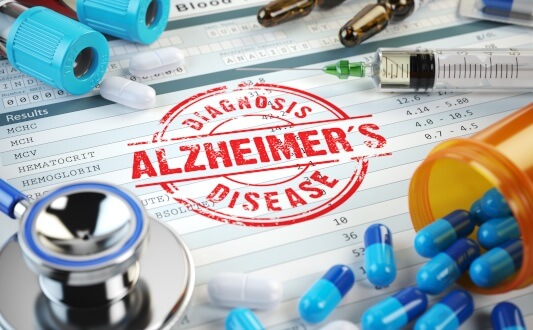Alzheimer's disease (AD) is a major public health problem. According to the Alzheimer's Association, about 6.2 million people are living with the disease in the USA alone, and that number is projected to rise to nearly 14 million by 2050. Classic treatment eliminates symptoms and does not affect the underlying cause of the disease, that is, the accumulation of pathological proteins in the brain and degenerative changes in the nervous system. Stem cell therapy for Alzheimer's disease repairs damaged neurons, slowing the progression of pathological changes and improving patients' quality of life. Over the past 5 years, more than 400 materials on this topic have been published in authoritative scientific sources.
Content
- What is the effect of stem cells on Alzheimer's disease?
- What is the process of Alzheimer's disease treatment with stem cells?
- Other non-classical treatments for Alzheimer's disease
- How can I take full advantage of Alzheimer's treatment options?
What is the effect of stem cells on Alzheimer's disease?
Stem cells have two important properties: they can multiply indefinitely, and they can give rise to any organs and tissues in the human body. Thanks to this, stem cell therapy directly affects the following two mechanisms of the development of neurodegenerative diseases:
- Stem cells restore connections between neurons. Beta-amyloid plaques destroy the processes of nerve cells, namely axons and dendrites. The result of this is incoordination of nervous activity and impaired cognitive functions. For example, a person cannot reproduce events recorded in long-term memory because they are stored in another part of the cerebral cortex, or they forget recent news or simple words. Stem cells secrete growth factors that stimulate the restoration of damaged neurons and the formation of new functional connections.
- Stem cells eliminate dystrophic changes in neurons. The accumulation of neurofibrillary tangles in the brain from abnormal tau protein, a second protein associated with AD, prevents neurons from receiving oxygen and glucose. Dystrophic changes develop in the cells, and with prolonged nutrient deficiency, they die. Stem cells trigger the process of neuronal regeneration and increase their resistance to hypoxia and other deficiencies.
The main benefits of stem cells for Alzheimer's disease compared to the classical protocol can be described as follows:
- Damaged neurons are restored, and the regeneration process is initiated
- Completely destroyed neurons are replaced by young and healthy cells
- Functional connections between all types of neurons are improved
- Inflammatory activity in brain tissue is reduced
The use of mesenchymal stem cells for Alzheimer's disease is an opportunity not only to alleviate symptoms and make caring for a patient with AD easier for relatives, but also to a certain extent to restore memory, critical thinking, and intelligence. Induced pluripotent stem cells (iPSCs) are also being studied in clinical trials. These are ordinary cells, most often skin cells, that are artificially returned to the state of stem cells. Like ordinary stem cells, iPSCs are capable of forming elements of nervous tissue.
What is the process of Alzheimer's disease treatment with stem cells?
A standardized stem cell therapy protocol will be developed following FDA approval. Stem cells for the treatment of Alzheimer's disease are currently used based on the practical experience of doctors at specialized clinics who have assessed all the risks and benefits and are ready to offer their patients this type of treatment. This is usually an outpatient procedure that takes place in several stages:
- Day 1. Registration at the hospital, primary examination by a doctor, and laboratory and instrumental diagnostic tests to assess the patient's condition before starting a stem cell therapy procedure.
- Day 2. Injection of stromal stem cells. This is a single intravenous infusion of the drug that takes about 30-60 minutes. Following the procedure, the patient remains under medical supervision in the clinic for the whole day. On this day, vitamin preparations and amino acid mixtures may also be administered for more active reproduction of the injected young cells.
- Day 3. Follow-up medical examination and discharge from the hospital. Upon discharge, the patient receives recommendations for further follow-up and the intake of medicines. Your doctor can immediately schedule a repeat stem cell transplantation procedure for you if required.
The procedure takes longer if the patient's own stem cells are used because healthcare workers and technologists need to obtain a sufficient amount of cellular material and produce a high-quality drug. In most cases, the source of stem cells is blood or subcutaneous fat. If blood sampling is planned, the patient is first given drugs that stimulate the release of stem cells from the bone marrow into the bloodstream.
After obtaining blood or adipose tissue, mesenchymal stem cells (MSCs) are isolated from them. Typically, patients with Alzheimer's disease are elderly, so they have a limited supply of their own stem cells. The next stage of the technological process eliminates this drawback: the resulting cells are cultivated in laboratory conditions, increasing the number to millions. The drug that is ready to be injected into a patient will contain about 300 million viable and purified stem cells, which are ready to actively restore brain tissue.
The use of the patient's own stem cells is the preferred option because they match the body's tissues according to the major histocompatibility complex (MHC). This guarantees the absence of unwanted immunological reactions and higher treatment efficiency. That is why clinics specializing in the comprehensive treatment of Alzheimer's disease have GCP-certified laboratories.
Other non-classical treatments for Alzheimer's disease
The high efficiency of using stem cells for Alzheimer's disease is associated with the restoration of damaged neurons. But is it possible to eliminate the damaging factor itself, that is, the pathological beta-amyloid and tau proteins? Such an opportunity would allow medicine to reach new heights in the treatment of neurodegenerative diseases. And it does exist, which is confirmed by the fact that four similar methods are undergoing clinical trials and are gradually entering clinical practice.
Amyloid-specific antibodies are substances that remove excess beta-amyloid from the brain. Due to the uniqueness of the molecule, such antibodies can recognize and attack beta-amyloid, thereby removing its accumulations from the nervous tissue. This is a passive type of immunotherapy: ready-made substances are injected into the body that a person's own immune system is not capable of producing. The vaccine is used in people with mild to moderate Alzheimer's disease under the age of 80. It became the first drug for the pathogenetic treatment of Alzheimer's disease that the FDA has approved in the last 20 years. And thanks to the brilliant results of preliminary clinical trials, permission for use was granted through an accelerated procedure. The main limitation of the use of such a vaccine is the relatively high cost of treatment.
Beta-amyloid vaccines are the first active immunotherapy option for Alzheimer's disease. After receiving such a vaccine (currently the UB-311 vaccine), the patient's immune system begins to recognize beta-amyloid accumulated in the brain as a target for attack. The drug is currently undergoing phase IIA clinical trials and has already received "fast track" status as a unique drug that has no analogues on the pharmaceutical market. Compared with amyloid-specific antibody drugs, beta-amyloid vaccines require less frequent administration. They are also associated with a lower incidence of adverse events in the brain (ARIA) and are more affordable in terms of price.
Dendritic cell-based vaccines are the beginning of a new era in Alzheimer's disease treatment. Like beta-amyloid vaccines, dendritic cell-based vaccines train a person's immune system to attack and destroy amyloid plaques. But unlike the first drug, dendritic cell-based vaccines do not trigger immune inflammation in healthy brain tissue. Such vaccines do not have any disadvantages compared to other types of active immunotherapy, which means that their use does not cause ARIA, brain tissue swelling, or hemorrhages. The drug is manufactured individually based on the patient’s blood cells and is administered subcutaneously in a hospital setting. The treatment is well tolerated, and the effect lasts for months: immune memory cells remember that beta-amyloid needs to be attacked.
REM therapy is another method of influencing the immune system, which suppresses chronic neuroinflammation and helps remove tau protein from the nervous system. Doctors isolate a pool of immune cells from the patient's blood, that is, monocytes, which become regenerative anti-inflammatory macrophages (M2) after their processing in the laboratory. A vaccine containing activated regenerative macrophages is administered intravenously or into the cerebrospinal fluid only once, and its effect lasts for several months.
How can I take full advantage of Alzheimer's treatment options?
Most hospitals offer people with Alzheimer's disease standard treatment regimens that provide only modest symptom relief. European clinics, in particular clinics in Germany, are not limited to this protocol but use every opportunity to help a person.
When undergoing treatment at German hospitals, you can undergo stem cell therapy, receive a vaccine with amyloid-specific antibodies, or take part in clinical trials. The experience of specialized clinics allows them to actively use stem cells in combination with immunotherapy methods.
If you are planning to travel to Germany for treatment from another country, you are welcome to contact Booking Health, an international medical tourism agency. The company's doctors will study your medical reports and recommend a clinic for stem cell treatment or immunotherapy. You can also check the average cost of treatment on the Booking Health site. The specialists from the Booking Health company will:
- Make an appointment for you at a specialized clinic without a long waiting period
- Organize a preliminary remote consultation with a German doctor if necessary
- Help you apply for a visa and prepare documents for traveling for your treatment
- Translate the results of your previous diagnostic tests into German so that you do not have to undergo them again
- Organize flights and transfers and take care of accommodation during outpatient treatment
- Provide treatment at reduced prices and without any additional taxes for foreigners
- Maintain contact with the clinic and doctor after the completion of the course of therapy
Booking Health's experience will allow you to use all the possibilities of treating Alzheimer's disease and get the best possible result.
Choose treatment abroad and you will for sure get the best results!
Authors:
This article was edited by medical experts, board-certified doctors Dr. Nadezhda Ivanisova, and Dr. Bohdan Mykhalniuk. For the treatment of the conditions referred to in the article, you must consult a doctor; the information in the article is not intended for self-medication!
Our editorial policy, which details our commitment to accuracy and transparency, is available here. Click this link to review our policies.
Sources:
Read:
Stem cell treatment in Germany
New Alzheimers treatment in Germany: REM (regenerative anti-inflammatory macrophages)
Don't know where to start?
Contact Booking Health







